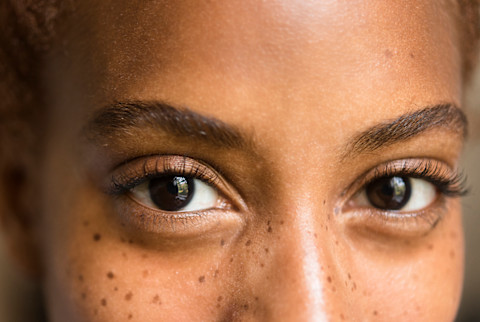Vision Impairment May Raise Your Dementia Risk, Research Suggests

Approximately 6 million people have vision impairment1 in the U.S. alone. What you may not know is that the earlier treatment takes place, the better—even if it’s as simple as getting a correct eyeglasses prescription.
In fact, keeping tabs on your eye health just might serve your brain health down the line, according to research. Here's what to know:
The link between vision and cognitive longevity
A study out of Kellogg Eye Center at The University of Michigan published in JAMA Ophthalmology found that all types of vision impairment (including nearsightedness, farsightedness, and contrast sensitivity) were associated with a higher dementia prevalence2. Having multiple forms of vision impairment was more strongly associated with dementia than having just one.
The correlation was identified by analyzing the 2021 National Health and Aging Trends Study (NHATS) which is a population-based, nationally representative panel study that included 3,817 respondents 71 years and older.
The group took vision assessments to measure their ability to see up close and far away, along with a specific test to measure contrast sensitivity—the ability to see letters that don’t contrast strongly with the background color provided. Cognitive abilities were assessed using memory tests. Participants' medical records were also collected.
Out of the 3,000+ participants, over 12% of the group had dementia. However, among those with vision impairment, almost 22% had dementia—a significant increase.
Those numbers change when discussing the severity of vision impairment, as those in the moderate to severe distance vision impairment group were 72% more likely to have dementia than those without any vision impairment at all.
Why this matters
This research provides more incentive to care for your eyes—even if your vision is strong right now. This will become increasingly important considering that more than 50% of the world population3 is predicted to have a distant vision impairment by 2050–a significant leap from the current 20%.
“As most VI is preventable, prioritizing vision health may be important for optimizing cognitive function,” the authors of the study note.
So, what are the best ways to support eye health daily? According to integrative optometrist Marina Gurvich, OD "eye diseases occur due to a combination of genetics, oxidative stress, and inflammation." She recommends wearing sunglasses during the day and blue-light-blocking glasses at night, exercising regularly, avoiding harsh products when washing your face, and getting plenty of sleep in the name of eye health.
Eating a healthy diet and supplementing can also pay off for your eye health. Eating a Mediterranean-style diet4 seems to be most helpful for preventing ocular disease, says Gurvich, while supplements that have been shown to protect the eyes include maqui berry5, lutein and astaxanthin6, and omega-3s7.
Finally, tending to your overall health will also support your eyes. Chronic health conditions such as diabetes, high blood pressure, and heart disease3 can contribute to vision impairment—as does smoking and physical inactivity, the CDC warns. So your eye health doesn’t start and stop with the obvious prevention methods.
More than anything, be sure to speak with your doctor if you’re concerned about your vision. If you have a current prescription that doesn’t work as well as it used to, stay on top of getting it updated.
How often do I need an eye exam?
Vision health is not always accessible, and some insurance plans do not cover regular screenings for adults. This is a roadblock the healthcare system should be vigorously working to address—as noted here, vision health is directly related to optimal full-body and cognitive health and should not be ignored or dismissed.
The takeaway
A study found that those with vision impairment were more likely to develop dementia than those without it. This finding should encourage healthcare providers to check vision regularly and provide accessible treatment options when needed.
If you are concerned about your vision or find that your current vision treatment isn’t working, chat with your doctor. For more vision health tips, check out this complete guide from an integrative optometrist.
7 Sources
- https://www.cdc.gov/vision-health-data/prevalence-estimates/vision-loss-prevalence.html#:~:text=Overall%20findings&text=Approximately%206%20million%20Americans%20have%20vision%20loss%20and%201%20million%20have%20blindness.
- https://jamanetwork.com/journals/jamaophthalmology/article-abstract/2807125
- https://www.ncbi.nlm.nih.gov/pmc/articles/PMC8759558/
- https://www.ncbi.nlm.nih.gov/pmc/articles/PMC10181476/
- https://pubmed.ncbi.nlm.nih.gov/37026311/
- https://iovs.arvojournals.org/article.aspx?articleid=2622933
- https://pubmed.ncbi.nlm.nih.gov/30702470/
